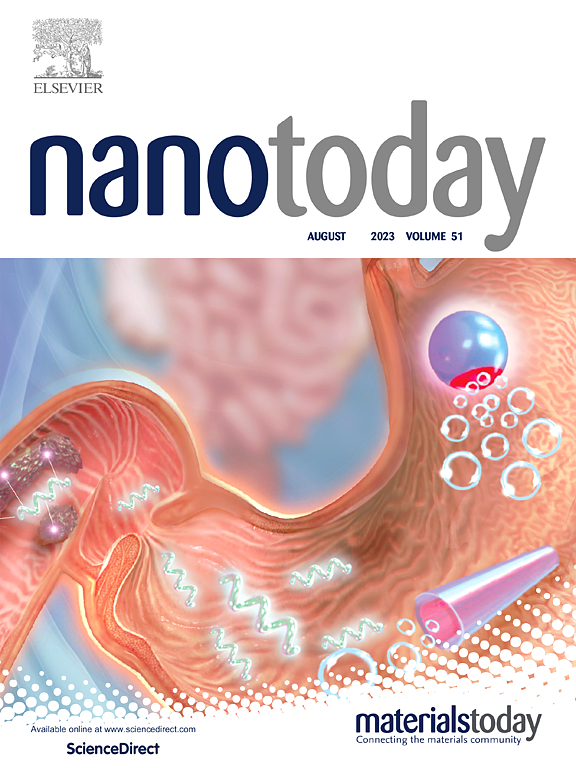巨噬细胞靶向多糖纳米免疫调节剂,具有空间和时间编程的药物释放用于癌症治疗
IF 10.9
1区 材料科学
Q1 CHEMISTRY, MULTIDISCIPLINARY
引用次数: 0
摘要
重编程肿瘤相关巨噬细胞(tam)是一种很有前途的策略,可以逆转肿瘤免疫抑制微环境(TIME),用于癌症免疫治疗。然而,实体肿瘤中巨噬细胞的缺乏需要靶向给药,以实现有效的免疫激活,同时减少不良副作用。同时,TAM激活的负反馈通过诱导T细胞衰竭而影响免疫治疗效果。在这项工作中,我们报道了一种巨噬细胞靶向多糖纳米免疫调节剂(Dex-RN),通过激活TLR7/8通路和抑制IDO负通路,具有空间和时间编程的药物释放,可用于癌症治疗。与对照组(19.0 %)相比,dexx - rn在体内表现出较高的TAM靶向能力,D10-RN为40.8% %,D70-RN为44.3% %,并且具有快速的TLR7/8激动剂但缓慢的IDO抑制剂释放动力学,以解决TLR7/8途径激活的负反馈影响。因此,Dex-RN显著提高了巨噬细胞M1极化效率,并提高了细胞表面标记物和细胞因子的表达水平。在4T1小鼠肿瘤模型中,Dex-RN对肿瘤生长的抑制作用(66% %)高于游离药物混合物(43% %),并通过诱导巨噬细胞M1极化、激活CD8+ T细胞和抑制Treg细胞来增强肿瘤免疫治疗。因此,这项工作强调了空间和时间编程的多糖纳米免疫调节剂用于tam介导的癌症免疫治疗的概念。本文章由计算机程序翻译,如有差异,请以英文原文为准。
Macrophage-targeted polysaccharide nano-immunomodulators with spatial- and time-programmed drug release for cancer therapy
Reprogramming tumor-associated macrophages (TAMs) represents a promising strategy to reverse tumor immunosuppressive microenvironment (TIME) for cancer immunotherapy. However, the deficiency of macrophage cells in solid tumors requires targeted drug delivery to accomplish efficient immune activation while reducing the adverse side-effects. Meanwhile, the negative feedback of TAM activation compromises immunotherapy efficacy by inducing T cell exhaustion. In this work, we report a type of macrophage-targeted polysaccharide nano-immunomodulators (Dex-RN) with spatial- and time-programmed drug release for cancer therapy by activating the TLR7/8 pathways and inhibiting the negative IDO pathway. Dex-RN exhibited high TAM targeting capability in vivo with 40.8 % for D10-RN and 44.3 % for D70-RN as compared with the control (19.0 %), and possessed fast TLR7/8 agonist but slow IDO inhibitor release kinetics to address the impact of the negative feedback of TLR7/8 pathway activation. Consequently, Dex-RN generated significantly enhanced macrophage M1 polarization efficiency with superior expression levels of cell surface markers and cytokines. In a 4T1 murine tumor model, Dex-RN showed enhanced tumor growth inhibition (66 %) compared with free drug mixture (43 %), and potentiated cancer immunotherapy by inducing macrophage M1 polarization, activating CD8+ T cells and inhibiting Treg cells. Thus, this work highlights the conception of a spatial- and time-programmed polysaccharide nano-immunomodulator for TAM-mediated cancer immunotherapy.
求助全文
通过发布文献求助,成功后即可免费获取论文全文。
去求助
来源期刊

Nano Today
工程技术-材料科学:综合
CiteScore
21.50
自引率
3.40%
发文量
305
审稿时长
40 days
期刊介绍:
Nano Today is a journal dedicated to publishing influential and innovative work in the field of nanoscience and technology. It covers a wide range of subject areas including biomaterials, materials chemistry, materials science, chemistry, bioengineering, biochemistry, genetics and molecular biology, engineering, and nanotechnology. The journal considers articles that inform readers about the latest research, breakthroughs, and topical issues in these fields. It provides comprehensive coverage through a mixture of peer-reviewed articles, research news, and information on key developments. Nano Today is abstracted and indexed in Science Citation Index, Ei Compendex, Embase, Scopus, and INSPEC.
 求助内容:
求助内容: 应助结果提醒方式:
应助结果提醒方式:


